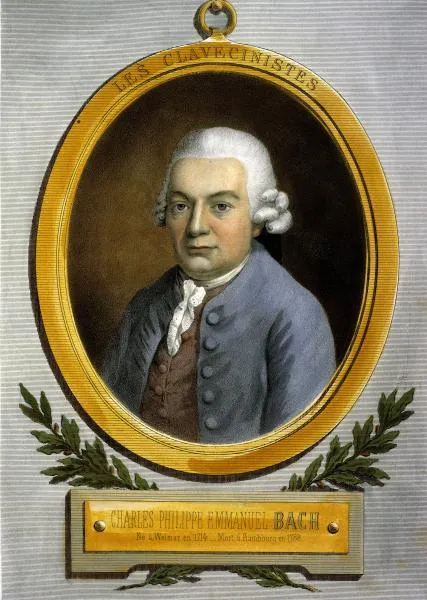
Name: Carl Philipp Emanuel Bach
Birth: 1714
Death: 1788
Nationality: German
Profession: Pianist and composer
1788 – Carl Philipp Emanuel Bach, German pianist and composer (b. 1714)
In the heart of the 18th century, a storm of creativity was brewing in Europe. Amidst this tumult, Carl Philipp Emanuel Bach emerged as a beacon of innovation in music. Born in 1714, he was the second son of the illustrious Johann Sebastian Bach. From an early age, C.P.E. Bach found himself engulfed by melodies and harmonies that would shape not just his future but also alter the landscape of Western music forever.
As a young man, he was heavily influenced by his father's teachings; however, instead of merely emulating his father’s Baroque style, C.P.E. sought to carve out his own identity within the musical world. Imagine him an ambitious youth absorbing everything from sacred choral works to lively dances, yearning to express emotions that went beyond mere notes on a page.
His journey into adulthood took him from Leipzig to Hamburg where he served as court musician for Frederick II of Prussia a position that afforded him not only stability but also exposure to cutting-edge ideas in both composition and performance practices. Ironically, while many composers were still anchored in tradition at this time, C.P.E. began experimenting with new forms and structures which would later become hallmarks of the Classical era.
The year 1738 marked a significant turning point: it was then that he published his first collection of keyboard works titled “Sonatas for Harpsichord or Clavichord.” This work showcased his unique blend of expressive depth and technical prowess a stark departure from the rigid formalism that characterized much of Baroque music.
As time passed, critics recognized C.P.E.'s burgeoning talent; yet despite this acclaim, he often grappled with self-doubt who knows how many nights were spent questioning whether he could ever step out from under his father's shadow?
C.P.E.’s compositions blossomed during this period: sonatas filled with dynamic contrasts and rich emotional content began flowing from his fingertips like water gushing through a fountain! His music pulsated with life a reflection perhaps not just of artistic genius but also personal struggles; each note seemed imbued with longing and fervor.
One can only imagine what it must have felt like for audiences at concerts where works such as "Keyboard Sonata in A Major" thrilled listeners seemingly simple motifs suddenly giving way to intricate passages full of surprises! Yet these experiences weren't just entertainment; they hinted at broader societal shifts toward individuality and personal expression all resonating through every note played onstage.
C.P.E.'s style began to gain traction throughout Europe but fame came hand-in-hand with challenges too! He faced increasing competition from emerging composers like Haydn and Mozart who were quickly establishing their names as leading figures within their generation's musical narrative. As success eluded him during certain years due largely due these rivals gaining prominence... did doubt creep back into those candle-lit nights spent composing?
A Musical Prodigy
Growing up in a highly musical family, C.P.E. Bach showed an early inclination towards music. He received formal training in composition and keyboard at the St. Thomas School in Leipzig and later studied law at the University of Leipzig. However, his passion for music prevailed, leading him to pursue a career as a composer and performer.
Career Highlights
One of Bach's most significant appointments was as a harpsichordist at the court of Frederick the Great in Potsdam, where he served for nearly 30 years. His role not only allowed him to refine his style but also to influence the musical tastes of his time. He composed numerous works, including piano sonatas, symphonies, and choral music that showcased his mastery of form and emotional expression.
Stylistic Innovations
C.P.E. Bach is often hailed as one of the most innovative composers of his time. He was a key figure in the development of the Empfindsamer Stil, or "sensitive style," which emphasized the expression of deep emotions over rigid structures. This approach influenced many subsequent composers, including Haydn and Mozart, and laid the foundation for the Romantic era.
His most famous work, the Hamburg Symphonies, highlight his ability to blend complexity with emotive melodies, making them a staple in the concert repertoire. His keyboard works are particularly celebrated, with the Prussian and Wurttemberg Sonatas demonstrating his virtuosity and innovative use of harmony.
A Transitioning Soundscape
The mid-1750s ushered forth another wave the “Empfindsamer Stil,” or sensitive style which championed more intimate emotional expression than previously seen within classical compositions! Perhaps it’s fair to say that without C.P.E.’s contributions paving way for future innovators across generations who followed suit including Beethoven our modern understanding surrounding symphonic structures might look vastly different today!
Pioneering New Directions
In so doing though... one can't overlook how innovative yet unyielding styles resulted often lead directly towards exploration into unexplored territories musically speaking? Consider how composers after him adopted elements derived specifically from nuances established throughout pieces composed earlier which remain relevant well over two centuries later!
The fruits borne out through trials endured whilst navigating artistic landscapes ultimately yielded grand results! It wasn’t uncommon then either as one historian remarked that during these revolutionary times we witness simultaneous evolutions taking place across disciplines ranging arts sciences alike!
Final Years: Reflection & Regrets
This story does not merely end upon reaching certain heights though… No it culminates instead upon reflection regarding life choices taken alongside paths left untrodden before departing this world altogether… 1788 saw Carl Philipp Emanuel Bach pass away aged seventy-four amidst profound legacy marked undeniably triumph mingled deep-rooted sorrowful shadows lingering behind closed doors!
A Farewell Yet Not Forgotten
While critics sang praises loudly celebrating artistry left behind perhaps quietly hidden regrets nestled close under surface linger still whispered among silent night sounds surrounding gravesite offering glimpses depths unknown dwelling intricacies expressing truths buried far beneath façade constructed over decades past...


